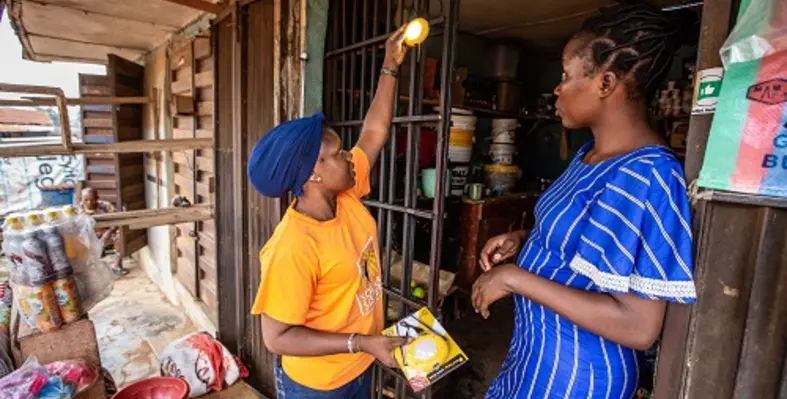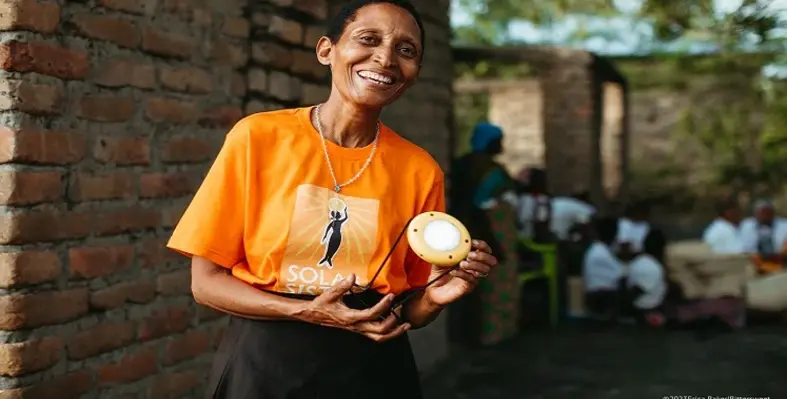Joanna Pinneo, communications manager at Solar Sister, sheds light on women's empowerment and sustainable energy access across Africa's last mile communities
Solar Sister supports local women in Africa to create clean energy businesses, empowering female entrepreneurs in Nigeria, Kenya, and Tanzania. The organisation’s work has earned it a spot among the finalists for the 2024 Ashden Awards, which recognise innovative initiatives driving inclusive climate innovation – the finals will be held at a ceremony on 27 June. It was nominated for this accolade with reference to the company successfully supporting more than 10,000 woman entrepreneurs in launching their businesses selling solar products. Africa Review spoke to Pinneo to learn more about the trailblazing company ahead of the awards ceremony in June.
African Review: Could you please provide a brief background of the company and how its journey has progressed to this point?
Pinneo: The origins of Solar Sister trace back to 2008 when Katherine Lucey, a former American investment banker, encountered Rebecca, a Ugandan farmer in a rural area. Using a solar lamp to illuminate her chicken coop, Rebecca demonstrated how solar energy could revolutionise everyday life. This single act of innovative entrepreneurship showcased the transformative power on livelihoods: the enhanced lighting led to increased egg production. As her sales grew, Rebecca built a profitable farm, elevated her family's living conditions, and even established a school for the community. Katherine thought, “If one woman can make such an impact with a solar panel, what could a whole network of women accomplish?”
Katherine met Neha Misra, an Indian energy economist, poet, and folk artist who had personally witnessed the ripple effect of female-led solar energy initiatives in India. Katherine and Neha laid the groundwork for an exceptional entity: a social enterprise that prioritises empowering local women to distribute clean energy solutions.
Around the 2008-2009 time frame, organisations started designing product-based solar such as small solar lamps and home systems. This product-based solar system allowed solar panels to be widely distributed far beyond the grid and even beyond a marketing network from traditional storefronts. It also allowed people access to a product that was affordable, appropriate, rugged, and built for design in these very remote communities. These products opened up this marketplace in this community, and Solar Sister was formed to ensure that women were both part of that opportunity and could be part of the income opportunity that came along with it.
African Review: Could you describe some of the essential services and training that you provide to support women entrepreneurs?
Pinneo: Since 2009, Solar Sister has worked to fight energy poverty across sub-Saharan Africa by recruiting, training, and supporting women entrepreneurs to create clean energy distribution businesses. We provide at least 12 months of business training delivered by our staff of trained Business Development Associates in monthly Sisterhood meetings.
At the heart of Solar Sister is ‘recruit, train, and support.’ Women who are seeded or able to provide start-up capital on their own are recruited to become entrepreneurs and then begin gaining the knowledge, skills, and agency to build their clean energy businesses while having ongoing mentorship.
Solar Sister has recruited, trained, and supported over 10,000 entrepreneurs. We continuously support women to ensure that they can overcome seasonal challenges and feel connected to their Solar Sister Family.
Since its inception, Solar Sister has trained over 10,000 female entrepreneurs (10,689 per Q1 2024) and has 126 fulltime employees in Kenya, Nigeria, and Tanzania. It’s not just about numbers; it’s a story of resilience and empowerment in regions scarred by conflict and challenges. Solar Sister’s unique model has been implemented in war-torn areas and has supported women from all backgrounds, from people with disabilities to internally displaced persons and refugees.
Solar Sister’s impact is radiant and far-reaching. Imagine lighting up the lives of over four million people in rural communities where darkness once prevailed. Through the sale of 980,270 clean energy products, including 62,187 life-changing cookstoves, Solar Sister entrepreneurs have illuminated homes and significantly reduced indoor air pollution.

African Review: How important is your work in providing power to the population, especially in remote areas?
Pinneo: According to the US Department of Energy, energy poverty is defined as spending 6% or more of household income on energy access. Globally, those who don’t have access to reliable and affordable energy sources are said to be ‘energy poor’. In the US, non-low-income homes spend about 2% on energy.
We were looking at households that spend 20 and 25% of their income on kerosene, and women often walk miles to get light for their homes. Solar Sister was formed to address the need to bring a marketing and distribution solution to the gap of getting these products into the hands of the people who most need them. In the process, we brought the women into the core of the solution. These are rural areas where large-scale grid projects do not go, probably because it does not make sense to them financially. In other words, these communities would not have access to energy without the availability of smaller solar lamps, small home systems, or clean cookstoves. Even where there is some electricity access, it is not affordable to most people in the community, and/or it doesn’t work much of the time.
Lack of energy, much less affordable energy, is a daunting reality for a whopping 940 million people across the African continent who lack access to clean cooking fuels and technologies. Many will also be living in the dark in 2024, as 43% of the population – 600 million people – still lack access to energy. Population growth is already outpacing energy access growth. With the African population predicted to increase over the next decade, the challenge of energy access is being exacerbated at a global scale. As a result, the latest UN data indicates that the world is not on track to achieve Sustainable Development Goal (SDG) 7 on affordable, reliable, sustainable, and modern energy for all by 2030.
African Review: Why have you found it so important to target women entrepreneurs?
Pinneo: Solar Sister’s model centres on the nexus of women’s empowerment, energy poverty, and climate justice. It is even baked into our name, Solar Sister - gender nexus with energy access.
As primary household energy managers with powerful social networks, women are uniquely positioned to bring clean energy to millions of last-mile communities and are critical for successfully adapting clean energy solutions.
Creating business opportunities for women that not only offer them meaningful jobs but also tackle the need for affordable, clean energy can really get to the heart of what causes inequality. By doing this, we empower women economically and move towards sustainable development that meets our energy needs. If we don't acknowledge this, sub-Saharan Africa and the entire world will keep missing the mark on the United Nations Sustainable Development Goals (SDGs), including those aiming to improve poverty, health, education, gender equality, and access to clean energy.
Katherine Lucey, CEO, Solar Sister has stated, “We have found that the decision to include women was brilliant and that the women are fantastic salespeople. I'd say they go beyond being just agents, entrepreneurs, or salespeople. They are evangelical about bringing clean energy to communities. They know themselves what it means to have light. They know themselves what it means to cook on a stove to reduce the amount of smoke inhalation in their homes.”
These women live in sub-Saharan Africa and see the daily effects of climate change. They see the rain patterns changing. So they understand the importance of climate change in their lives in a way that I think sometimes we don’t. For these women, it’s something real, and so their ability to earn an income with this clean energy business and bring it to their community is building resilience in their community. It is also income that they use to support their families. Ultimately, it builds in them a sense of well-being, purpose, leadership and empowerment that you can see in their faces.
Solar Sister believes that all women should be given the opportunity to start a clean energy business, regardless of their socio-economic status. There are women in last-mile communities who do not have the startup capital to buy products and begin their businesses due to their vulnerability status. Solar Sister meets these women where they are and intervenes by providing them a leg up in starting their business via initial capital or other resources, closing the social disadvantage gap for vulnerable women and propelling them into their entrepreneurial journey.













